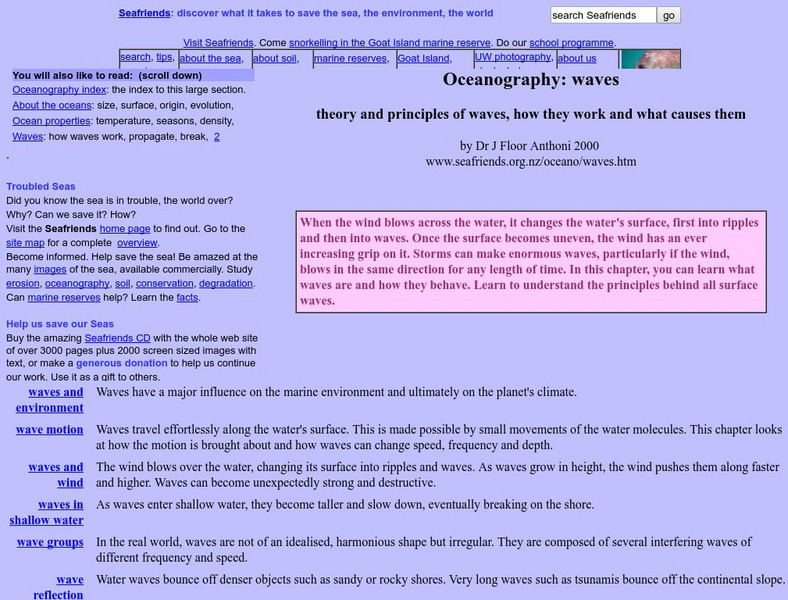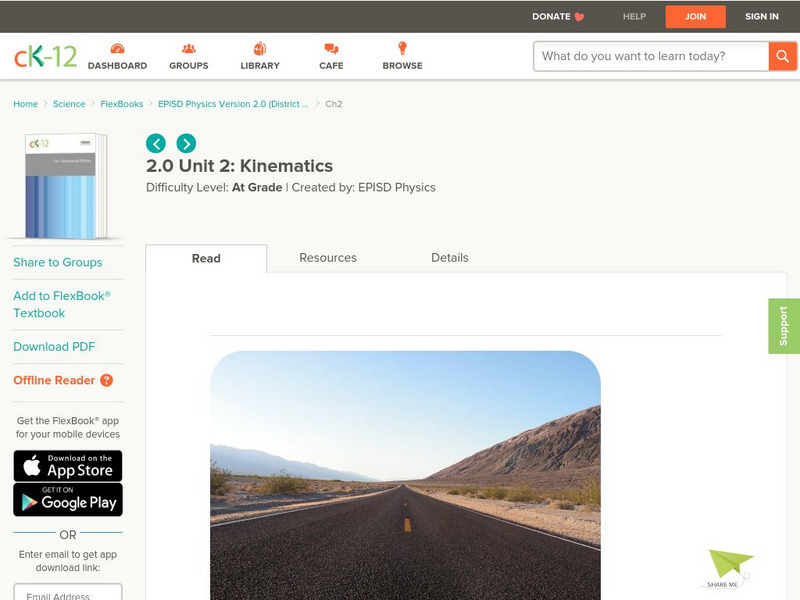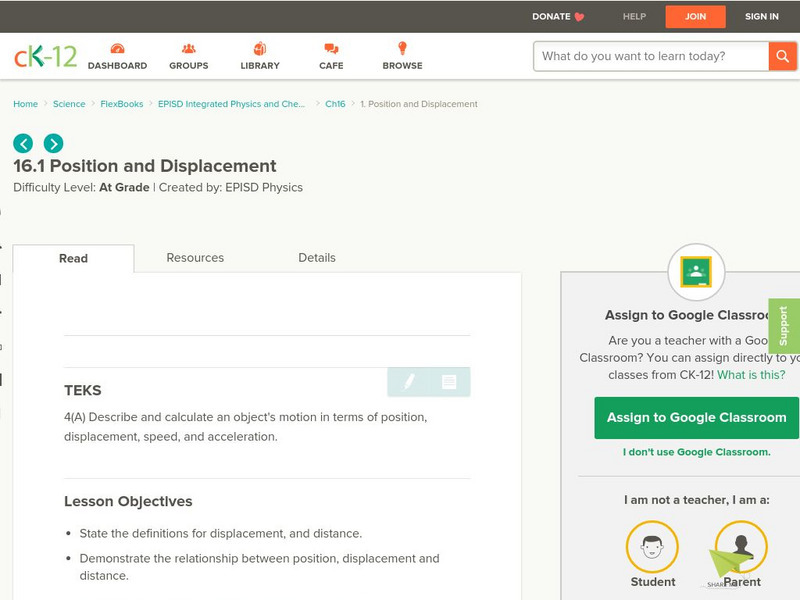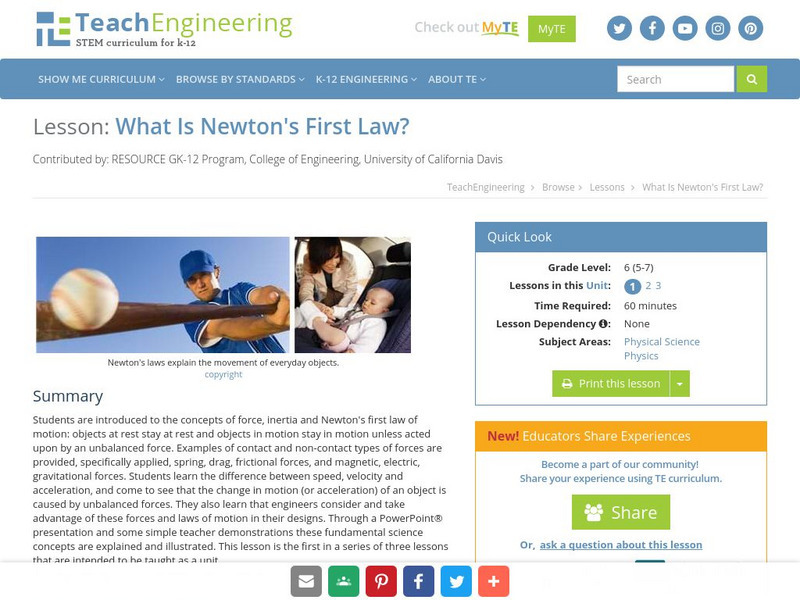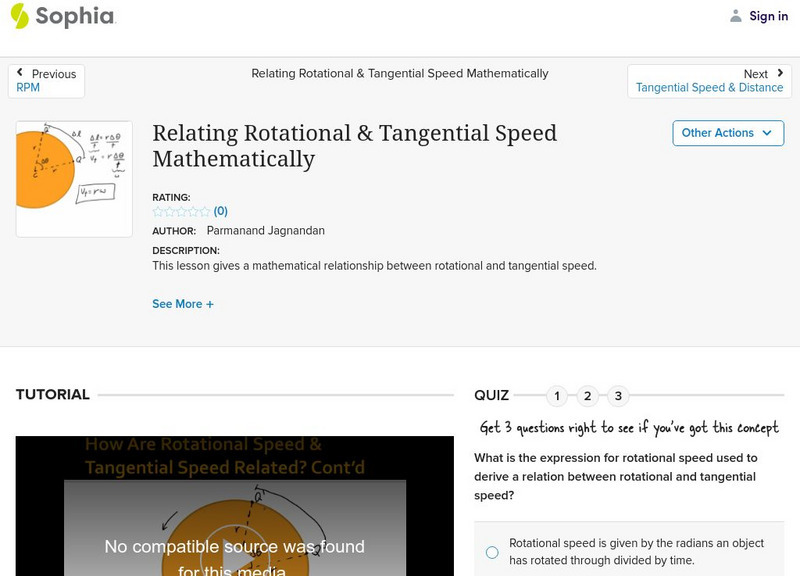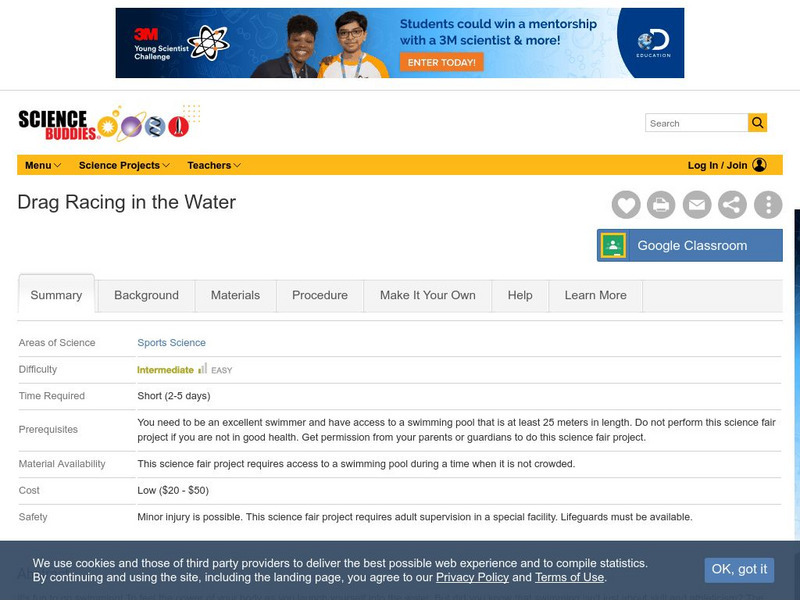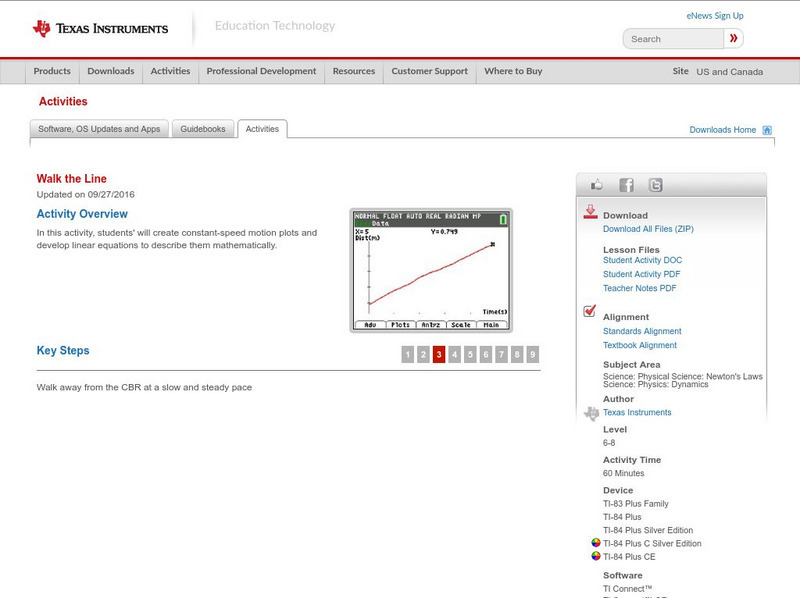University of Colorado
University of Colorado: Ph Et Interactive Simulations: Ladybug Motion 2 D
Learn about position, velocity, and acceleration vectors by moving the ladybug. Set the position, velocity, or acceleration, and see how the vectors change.
Georgia Department of Education
Ga Virtual Learning: Ap Physics 1: One Dimensional Kinematics
Using only two of our fundamental units, time and displacement students will build a framework to predict the motion of objects, starting with one dimensional motion.
CK-12 Foundation
Ck 12 Exploration Series: Simulations: Physics: Stadium Wave
[Free Registration/Login Required] A simulation that uses the classic sports stadium "wave" to learn about concepts important to wave motion and interference.
Other
Seafriends Marine Conservation and Education Centre: Oceanography: Waves
A very detailed article on the characteristics of waves and wave behavior. It discusses the influence waves have on the marine environment and the global climate, the physics of wave motion, the interactions between waves and wind, wave...
Science Education Resource Center at Carleton College
Serc: Using Velocity and Acceleration Vectors to Interpret the Motion of a Car
Students understand that vectors have both magnitude and direction components as they investigate velocity and acceleration vectors.
Georgia State University
Georgia State University: Hyper Physics: Wave Motion
Two wave graphs depicting a sine wave and relating the various characteristics (wavelength, amplitude, frequency, and period) of a wave to each other. The site includes an interactive JavaScript form in which the visitor enters one...
E-learning for Kids
E Learning for Kids: Science: Antarctica: Penguins: What Is Motion?
What do you know about Emperor penguins? Ernie is researching them and their migration across the continent.
TeachEngineering
Teach Engineering: What's Up With All This Traffic?
Expanding on the topic of objects in motion covering Newton's laws of motion, acceleration and velocity, which are taught starting in third grade, students are introduced to new concepts of speed, density, level of service (LOS) (quality...
CK-12 Foundation
Ck 12: Episd: Physics: Kinematics
[Free Registration/Login may be required to access all resource tools.] An online chapter focused on motion and the shapes it takes. Topics range from speed and velocity to acceleration and free fall. Find detailed visuals, learning...
CK-12 Foundation
Ck 12: Position and Displacement
[Free Registration/Login may be required to access all resource tools.] Students explore and calculate an object's motion in terms of position, displacement, speed, and acceleration.
TeachEngineering
Teach Engineering: What Is Newton's First Law?
Students are introduced to the concepts of force, inertia, and Newton's first law of motion: objects at rest stay at rest and objects in motion stay in motion unless acted upon by an unbalanced force.This lesson is the first in a series...
Utah Education Network
Uen: Rollin' On
Activity shows how gravity affects the motion of an object rolling up or down a hill.
Utah Education Network
Uen: May the Best Force Win
The greater the force applied to an object, the greater the change in speed or direction of the object.
Khan Academy
Khan Academy: What Is Velocity?
Velocity or speed? Instantaneous or average? Keep building your physics vocabulary.
Sophia Learning
Sophia: Relating Rotational & Tangential Speed Mathematically
A video lesson relating rotational speed and tangential speed. Video derives equation to show how to find tangential speed based on rotational speed. [4:32]
Texas Education Agency
Texas Gateway: Circular Motion & Gravitation: Rotation Angle & Angular Velocity
By the end of this section, you will be able to define arc length, rotation angle, radius of curvature, and angular velocity; and to calculate the angular velocity of a car wheel spin.
Science Buddies
Science Buddies: Drag Racing in the Water
It's fun to go swimming. To feel the power of your body as you launch yourself into the water. But did you know that swimming isn't just about skill and athleticism? The human body consists of skin, contours, and curves. How the water...
Better Lesson
Better Lesson: A Change of Direction Exploring the Impact of Forces
Learners will be able to determine a way to change the direction of a moving object by conducting a simple experiment. Included in this lesson are videos of the activity in action, a printable recording sheet, pictures of the set-up for...
Symmetry Magazine
Symmetry Magazine: Explain It in 60 Seconds: Cherenkov Light
Cherenkov light is explained here as the light emitted when a charged particle travels through matter faster than light would be able to. This would be slower, however, than the maximum speed of light, which occurs in a vacuum. "Explain...
Physics4kids
Physics4 kids.com: Velocity, Motion and Speed Oh My
This brief overview distinguishes speed and velocity. Vectors are explained along with acceleration and gravitation. Diagrams are used to help explain these concepts.
CK-12 Foundation
Ck 12: Physical Science: Position Time Graphs
[Free Registration/Login may be required to access all resource tools.] How motion and speed can be represented by a distance-time graph and how average speed can be calculated from it.
Texas Instruments
Texas Instruments: Walk the Line
In this activity, students will create constant-speed motion plots and develop linear equations to describe them mathematically.
Physics Aviary
Physics Aviary: Rolling Distance Lab
In this lab, students will be able to change the radius and the linear speed of a wheel. They can then see how each of these variables affects the angular speed. Students can also look at the relationship between angular distance and...
Physics Classroom
The Physics Classroom: Momentum and Collisions: Fish Catch Interactive
Students explore the relative mass of two colliding objects, and determine if that can be used to quickly predict the post-collision speed of the objects? An activity sheet guides learners through the process of determining the rule for...
Other popular searches
- Speed and Motion
- Forces and Motion Speed
- Motion Speed and Velocity
- Force Motion Friction Speed
- Motion Speed and Distance
- Motion, Speed and Distance
- Speed Velocity Motion
- Describing Motion Speed
- Motion and Speed Labs
- Slow Speed Motion
- Speed and Motion Graphs
- Motion and Speed Lessons





